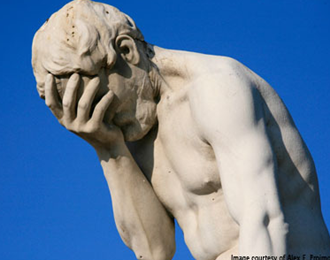Ashamed Shall Be…
02-04-2025 - Posted by Geert-JanOriginally posted on March 30, 2025 - by Andre Piet first version: July 24, 2013
In Isaiah 45, God makes an exceptional promise. He swears an oath—and He rarely does so. When He does this on exceptional occasions, it is, according to Hebrews 6, to indicate “all the more emphatically” that “it is impossible for God to lie” (6:17,18). Isaiah 45 says:
23 For I have sworn by Myself,
Gone out of My mouth hath righteousness—A word—and it turneth not back,
That to Me every knee shall bow,
Every tongue swear.
24 Only in YHWH, one saith to Me,
Is righteousness and strength,
Unto Him he cometh in,
And ashamed are all their adversaries…
under compulsion?
It is the apostle Paul who cites and confirms these words in Romans 14:11 and Philippians 2:10. In Philippians 2, Paul especially emphasizes that it concerns a heartfelt acknowledgment. The word he uses for “confess” (ex-omologeo) indicates that it comes from within and does not occur under compulsion. It is therefore not mere lip service (external), but a confession with the tongue—which represents the inner being. One will bow the knee and confess “to the glory of God the Father.”
but or and?
In many translations, the words in Isa. 45:24, “and ashamed shall be…” are rendered as “but ashamed shall be.” That makes quite a difference. For when we read “but” here, it implies a group being distinguished from what precedes. The idea is then that although every knee shall bow and every tongue shall swear, only a portion of them will say “only in YHWH is righteousness and strength.” While another portion, on the contrary, shall be ashamed.
Through the word “but,” the translators suggest a contrast that is absent in the original text. The Hebrew uses the standard conjunction (the letter wav), just as in the same sentence it speaks of “righteousness and strength.” By translating this as “but” rather than “and,” one needlessly creates a contrast. While the actual thought is: all shall acknowledge YHWH, and those who were once inflamed in anger (literally: heated) shall be ashamed in doing so.
heated
A large part of humanity belongs to those who are ‘heated’ against God. This also applies to ‘atheists’. No intelligent being can, with a straight face, deny intelligent design in nature. That there is a Creator is evident. That some nevertheless present themselves as ‘atheist’ is usually because they are angry with God and do not wish to be associated with Him. Always again with the familiar motive: with so much evil in the world (pain, sorrow, hardship, sickness, death, etc.), God can hardly be good. And as an expression of that discontent, one chooses not to reckon with Him.
Behind religion, in practice, lies the same estrangement. One does not trust God and, out of fear of Him, tries to please Him.
contrast
In Isaiah 45, GOD swears that all who are ‘heated’ against Him shall one day be ashamed. They had formed a judgment about God that turned out to be completely premature. They had not reckoned with the fact that GOD truly is good and is able to turn evil into good (Gen.50:20). In the same Isaiah 45, God also declares Himself to be the Creator of all things, even of evil.
I am YAHWEH, and there is none else,
7 Forming light, and preparing darkness,
Making peace, and preparing evil,
I am YAHWEH, doing all these things.
—Isaiah 45:7—
GOD claims the glory that HE is the Creator of light and peace, of darkness and evil. As every creator does, GOD also creates by means of contrast. Heaven and earth, light and darkness, sea and land, male and female, etc. So it is also with good and evil (Gen.2:17). Knowledge of good is not available separately. Only through evil does good become visible.
Without enmity, no reconciliation (Col.1:20,21);
Without sin, no grace (Rom.5:20);
Without struggle, no victory (Rom.8:37);
Without death, no vivification (1Cor.15:22).
ashamed
One day humanity will blush with shame for the evil intentions it had ascribed to GOD. Think, for example, of the doctrine of endless hell punishment, but also of the doctrine of annihilation (= death is the end). Such teachings deny that GOD is good and that He never forsakes the works of His hands. They deny that He will set everything right and bring everyone to justice. That is His righteousness (= skilled in justice) and the purpose of all His judgments!
The presence of evil in the world is not in conflict with God’s goodness. On the contrary! Evil is necessary for GOD to prove His goodness! And the proof that GOD IS GOOD shall one day have been sufficiently delivered to every human being.
Every tongue shall acknowledge it under oath!

 English Blog
English Blog